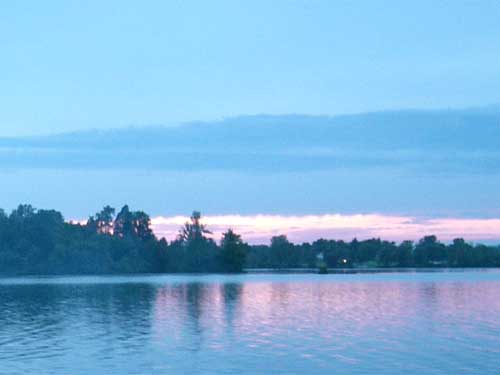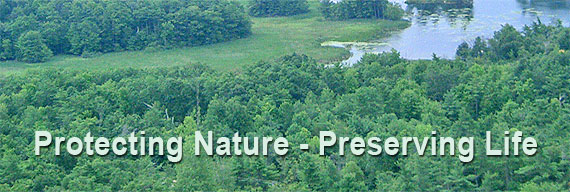|
Bruce
Peninsula National Park - In the heart of a World Biosphere
Reserve, the 'Bruce' is a place of
global significance. The massive, rugged cliffs of the park are
inhabited by thousand year old cedar trees, overhanging the crystal
clear waters of Georgian Bay. The park is comprised of an incredible
array of habitats from rare alvars to dense forests and clean lakes.
Together these form a greater ecosystem - the largest remaining chunk
of natural habitat in southern Ontario.
Fathom
Five National Marine Park - It is Canada’s First National Marine
Park.
It protects 20 islands at the mouth of Georgian Bay, and a main
ecosystem
that extends from the surface water down 200 metres. Twenty-two
shipwrecks
are found in the park’s waters. If you don’t dive or snorkel, you can
see
shipwrecks from glass-bottom boats or visit Flowerpot Island where you
can camp, see the island’s namesake rock columns, visit a lighthouse
and
explore a cave. Fathom Five’s freshwater ecosystem contains some of the
most pristine
waters of the Great Lakes. The rugged islands of the park are a
reminder of the impressive lakebed topography found beneath the waves.
Georgian
Bay Islands National Park - Protecting
one of Canada's national treasures for your enjoyment: from
Honey Harbour to Twelve Mile Bay in southern Georgian Bay you will
discover spectacular landscapes, time-worn rock faces, diverse habitats
and the rugged beauty of the Canadian Shield. These magnificent islands
are accessible by boat only. The largest island, Beausoleil, offers
tent camping, overnight and day docking, heritage education programs
and hiking trails. Wheelchair accessible sites and reserved campsites
are also available at the Cedar Spring campground on Beausoleil Island.
Please note: Visitor information is available at the Parks Canada
Welcome Centre at Lock 45 in Port Severn however visitors with DayTripper
reservations are to travel directly to Honey Harbour to meet the boat.
Lake
Superior National Marine Conservation Area - Created in October
2007, this is the first national marine conservation area (NMCA) of
Canada
created since the passing of the National Marine Conservation Areas Act
in 2002. More than 70 species of fish inhabit the near-pristine waters
of Lake Superior, the largest of the Great Lakes. Gulls, herons,
eagles, and pelicans feed in these waters, while some also use island
habitats for breeding. There may be as many as 50 shipwrecks within the
Lake Superior NMCA – one of which, the Gunilda, Jacques Cousteau
characterized as the most beautiful wreck in the world. The area boasts
many other attractions related to geology, geomorphology, and flora and
fauna. Aboriginal presence in this area dates back at least 5000 years
and continues to the present day.
Point
Pelee National Park - A lush Carolinian forest oasis at the
southern tip of Canada, Point
Pelee National Park resounds with migrating song birds in the spring,
hums with cicadas in the summer, flutters with Monarch butterflies in
the fall and is a peaceful place of reflection in the winter.
Pukaskwa
National Park - Pukaskwa National Park's exceptional beauty is
revealed in its vistas
of Lake Superior and in the rugged, ancient landscape of the Canadian
Shield and northern forest. The spirit of the wilderness envelopes
those who explore this special place. The only wilderness national
park in Ontario, Pukaskwa protects 1878 square km of an ecosystem that
features boreal forest and Lake Superior shoreline.
St.
Lawrence Islands National Park - This wonderful park is located in
the heart of the Thousand Islands tourist area and it is Canada's
smallest
national park. Conceived in the 1870s, St. Lawrence Islands is a tiny
jewel with a rich and complex natural and human history.
Ontario
Parks - Take
some time to explore Ontario Parks. With over 330 parks, covering
9 million hectares that attract over 10 million visits each year, there
is a lot to discover! Visit a park and take a timeout from the
quick pace of everyday life.

|













